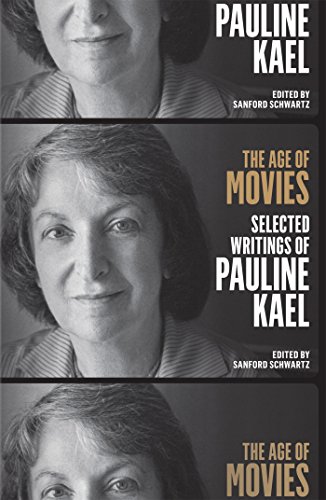
While there were plenty of good reviewers before her, Pauline Kael’s popularity as a movie critic saw her rise to level of rock star as she developed a devout following of readers and inspired writers to follow in her footsteps. Entertainment Weekly’s Owen Gleiberman told rockcritics.com she “was more than a great critic. She re-invented the form, and pioneered an entire aesthetic of writing. She was like the Elvis or the Beatles of film criticism.”
The Age of Movies is the literary equivalent of a career-spanning best-of album. The book opens with her essay bemoaning the then-current state of the medium in “Movies, the Desperate Art,” from 1956’s The Berkley Book of Modern Writing No. 3 and concludes with The New Yorker review of 1990’s The Grifters, published a few months before she announced her retirement on March 11, 1991. The book includes highlights such as reviews of Bonnie and Clyde, Nashville, and Norman Mailer’s biography on Marilyn Monore. The most notable omission, due to space limitations according to editor Sanford Schwartz, is the controversial “Raising Kane,” where she argued in favor of Citizen Kane’s co-screenwriter Herman J. Mankiewicz’s deserving as much credit for the film as Orson Welles.
Dubbed a “grand agent provocateur and mistress of verbal mayhem” by Jerry Roberts in The Complete History of American Film Criticism, Kael challenged the opinions of her peers and had no qualms about deviating from the mainstream when it came to films or directors. For example, her review of West Side Story dismisses both the film, as “a great musical for people who don’t like musicals,” and those who lauded it, like The New York Times’ Bosley Crowther and The New Republic’s Stanley Kauffmann.
But Kael didn’t always run counter to popular opinion as she found Singin’ in the Rain to be “just about the best Hollywood musical of all time.” What is most enjoyable about her work, aside from the obvious passion she exudes for the medium, is her ability to convey her reactions to a movie. Even if the reader disagrees with her opinion, she can make clear what didn’t work for her and why.
Pauline Kael stated in the introduction to For Keeps (1994), one of many collections of her work, “I’m frequently asked why I don’t write my memoirs. I think I have.” In an unconventional way, The Age of Movies serves as an autobiography as Kael reveals herself through her thoughts and reactions to movies and their makers. This book is a very worthy addition to the library of anyone whoever lost it at the movies.